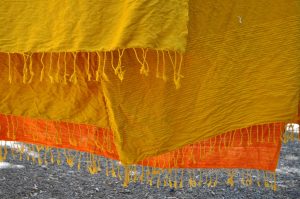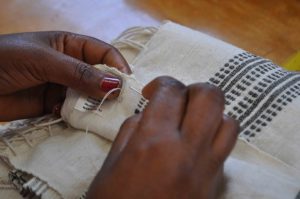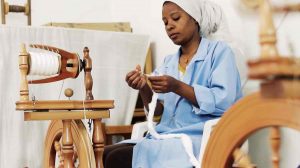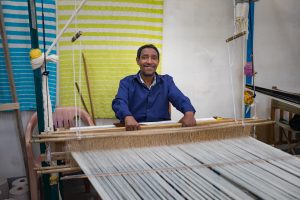Silk for a Queen
The name Sabahar consists of two Amharic words: “Saba”, the famous queen of Sheba and “har”, silk. However, silk, especially Eri silk with its rough, organic look, has only been extracted in Ethiopia since 2000. Sabahar was one of the pioneers from the very beginning. “To increase diversity, we import silk strains from India and combine them with our native silk and cotton.” Sabahar trains farmers in silk production in a company-owned training program. Sabahar buys Eri silk cocoons and threads from more than 50 farmers and rural cooperatives. Sabahar is hopeful that in the future mulberry silk will also be produced in Ethiopia.
Eri Silk Made in Ethiopia
Most of the silk produced in Ethiopia is Eri silk. This “wild” silk variety is simple but labor-intensive to cultivate. The Eri silkworms eat castor plants, which are abundant throughout the country. The caterpillars of the god-spinner are fed for forty-five days until they spin into their cocoon. The cocoon consists of short protein segments, looks woolly and is not completely closed. Therefore, the butterfly can leave the shell after its transformation. Since the pupae does not die in the cocoon, Eri silk is sometimes referred to as “peace silk” or “ahimsa silk”. The moths live only five days, mate, lay eggs and die. The life cycle starts over.
Cotton, Silk, Linen, Wool
Sabahar only processes natural fibres, besides cotton and silk, also linen and wool. Until now, flax is only grown in Ethiopia for linseed and oil production. For this reason, the company is still working with Eastern European linen, Sabahar has also been processing wool since 2016. Because the sheep breeds prevalent in Ethiopia do not provide high-quality wool, Sabahar uses Australian merino wool.


Kathy Marshall founded Sabahar in 2004. The Canadian-born development worker combines her passion for Ethiopian web tradition with social goals: “Our employees can apply traditional skills to modern products and designs. This provides the craft sector with a bridge to the global market and a reliable income for many families.”

Spinning
Sabahar buys hand-spun yarn from a network of women throughout Addis Ababa, who earn an extra income.
Weaving
Sabahar offers about 80 hand weavers a new, international market. A weaver can produce up to three scarves per day, depending on the design.

Dyeing
Sabahar uses local natural dyes such as coffee, onion peels, tea, marigold and cochenille, as well as imported natural colours such as indigo and logwood.
Making-up and finish
A dedicated women’s team takes over the final assembly at the Sabahar workshop in Addis Ababa. Currently, Sabahar products go to 17 different countries worldwide.
Photos: Sabahar